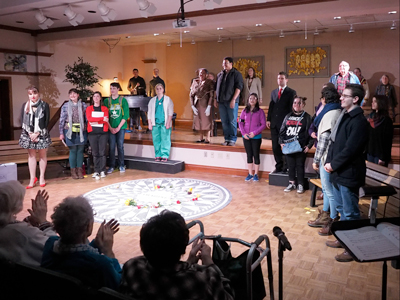by Daniel Hautzinger

On January 30, the ‘Sco was no less packed for Michael Torke’s Strawberry Fields and Gian Carlo Menotti’s The Telephone than it would be for the latest hyped indie band.
It was more decorated, though: Robert Cothran’s imaginative set design transformed the dark club into an attractively spare Central Park. The circular mosaic from the John Lennon Memorial, known as “Strawberry Fields,” dominated the floor, while quotes and the faces of Lennon and Verdi peered out from clusters of paper hung from the ceiling, as if shadows in the trees were forming images.
Cothran resides at Kendal at Oberlin, with whom Oberlin Opera Theater collaborated for Strawberry Fields. Other Kendal personnel included four ensemble members and the robust, husky-voiced Allen Huszti as the Workman.
The collaboration with Kendal, a retirement community, made Strawberry Fields a daring choice, as it deals with an elderly woman (Amber Monroe) and her refusal to enter an assisted living facility despite her children’s wishes. Believing she is at the opera instead of at Strawberry Fields, she befriends a student (Joshua Blue) and addresses him as her husband. Seeing her happiness among the motley array of people at the memorial, he readily encourages her fantasy and defends her desire to stay there instead of entering a home.
Blue and Monroe are both exceptionally talented singers, and their voices were especially thrilling in the close quarters of the ‘Sco. Unfortunately, Torke’s music handicaps more than it allows for vocal showcasing or even musical expression. Bland melodies jump across a singer’s range with no regard for fluidity, over endlessly skip-starting accompaniments (played by pianist and music director Daniel Michalak and conducted by John Paul Jennings).
Torke’s text-setting is, frankly, atrocious. Words are twisted and forced to fit his repetitive melodies with no attention to how they are actually pronounced. One of the most egregious examples was “opera” being stretched to three syllables (“o-per-a”), which begs the question of how much opera Torke has actually heard. He probably has seen a lot of musicals, however.
The dramatic structuring and songs (and they are songs, not arias) recall Broadway more than La Scala but lack the wit of Sondheim or the emotion of Rodgers. And the libretto by A.R. Gurney is daringly literal, as when the ensemble helpfully pointed out at the climax, “I sense tension… things are coming to a head.”
Oberlin did its best with the material, however. Staging by Sally Stunkel was lucid and the production was musically top-notch (despite the thin brightness of the electric keyboard used in place of a piano).
Luckily, all that talent found a suitable outlet in the second opera on the bill. Gian Carlo Menotti’s The Telephone could be a comedy show sketch, pitting Ben (Tayte Mitchell) against a constantly ringing telephone in a battle for the attention of Lucy (Margaret Langhorne). Eric Mikalauskas was the music director, Patrick Dunaj the pianist.
Menotti’s music is attractively cartoonish, and director Jason Goldberg fully embraced the ridiculousness it suggests. Langhorne was convincing as a gossipy ditz, flashing between cackles, fits of rage, and sobs in response to callers, all with a clear and agile voice. Mitchell was hilarious, especially in a section where he discovered a bottle of whiskey, draining more and more of it as Langhorne chattered away, oblivious.
And unlike in Strawberry Fields, every word was discernible, even in duets. Menotti’s lyrical writing mimics the natural tonal inflections of speech so well that that the singers could almost be speaking over the jaunty accompaniments.
After a second performance on January 31, the sets were struck and the ‘Sco returned to a club filled with booming beats and glitch electronics. Now that opera has moved into a popular music space, maybe it will learn from the sounds that normally exist there so that the dancers stick around for the opera and vice-versa. It’s no less fanciful an idea than most opera plots.
Photo by Dale Preston, Presto Photo.
Published on ClevelandClassical.com February 3, 2015.
Click here for a printable copy of this article


